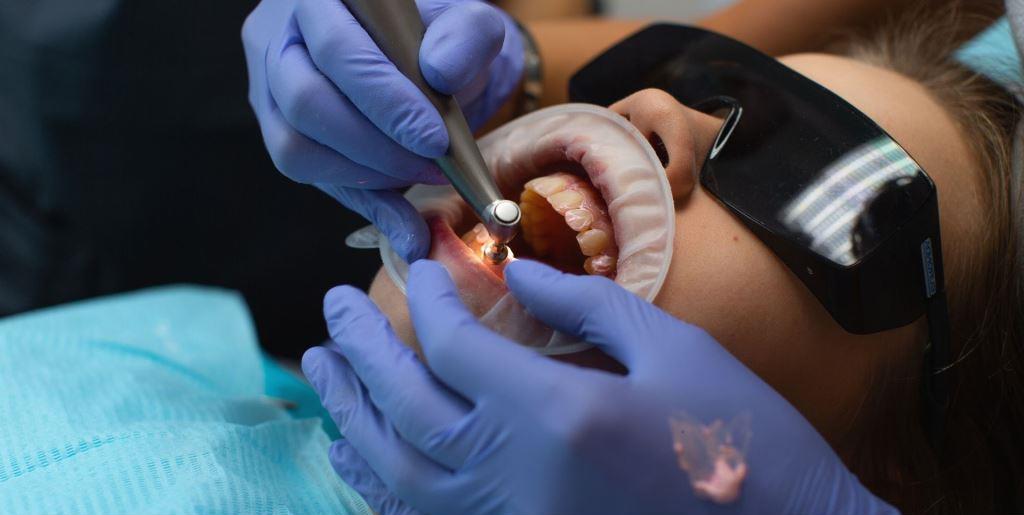Tartar builds up on the teeth, initially looking quite harmless, as a simple deposit right at the gum line. However, if not removed in time, it can lead to parodontosis and even tooth loss. Find out how often you should go for tartar removal in the UK and how to prevent excessive build-up on your teeth.
What is tartar?
Before we go into how to remove tartar from teeth, let's look at tartar itself. What is it and where does it come from? Well, tartar is mineralised plaque. While plaque forms just a few hours after brushing your teeth, tartar takes weeks or even months to form.
The plate is soft - a form of sludge that we remove During brushing. When it is not removed in time, it becomes mineralised and hardens, and then simple brushing is not enough - you will need tartar removal in the UK. You can read more about tartar itself in our article "Tartar on teeth - find out how it affects your health„.
And what does tartar look like? One of the first symptoms visible to the naked eye is dark borders near the gums. Over time, more and more of the tooth is affected - the tartar is yellow or brown in colour. There is usually more of it on the inside of the teeth. Read more about discolouration in the entry "What do changes in tooth colour mean and what are their causes„.

Tartar removal in the UK - take preventative care before treatment
Before you go for tartar removal in the UK, check how to prevent tartar build-up. It's better to prevent its build-up than to struggle with unpleasant consequences such as parodontitis. So it's time for a few words about prevention.
Firstly, proper oral hygiene. This is an absolute must. Brushing with fluoride toothpaste at least twice a day, and it is essential to clean the interdental surfaces with dental floss. If you don't know why this is so important, read our article "How to floss your teeth and why it's so important". Mouthwashes and tooth irrigators are also welcome.
What we eat also makes a difference. Eating foods that coat your teeth heavily, as well as starches or sugar, will have an impact on the build-up of plaque, which then forms tartar. When you do eat these, remember to brush your teeth after the meal. However, if you do not have this option, rinse your mouth with water.

How do I remove tartar from my teeth?
Removing tartar yourself at home is not possible. Don't believe any magic ways you ever hear about. You must visit your dentist or hygienist for this.
The removal of tartar in the UK is called scaling. Depending on the equipment used, we distinguish between traditional, ultrasonic, chemical, laser and chemical scaling. In our office, you will pay £80 for a scaling treatment. If you wish to combine it with sandblasting, i.e. the removal of deposits, and varnishing, i.e. the covering of teeth with a protective layer, you will have to expect a cost of £140.
It is not only important how to remove tartar from the teeth, but also how often to do it. It is assumed that an adult should perform hygienization procedures at least once every six months. You can read more about them in our article "Dental hygiene in the UK - scaling, tooth sandblasting, polishing and fluoridation„.

Consequences of not removing tartar
If we haven't yet convinced you that tartar removal in the UK is very important for your oral health, perhaps the consequences of not removing it will convince you.
Tartar is most often deposited right at the gum line in the first instance. The formation of subgingival calculus is also common, and from here it is a simple way to periodontitis, gingivitis or gingival recession. Any of these diseases, if left untreated, can even lead to tooth loss, probably the worst consequence we can imagine. If you would like to learn more about gum disease, please see our post "Gum disease - causes, symptoms and treatment„.
Diseases caused by unremoved tartar are not only an aesthetic problem, but also involve pain and frequent visits to the dentist. This, in turn, entails long and costly treatment and even the need for implants or a partial denture.
If you can't remember the last time you attended a removal tartar in the UK, it most likely means it's time for them to go. We invite you to visit to our practicewhere we carry out professional scaling.

